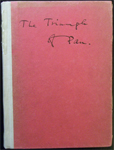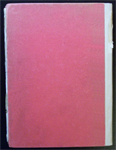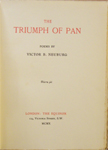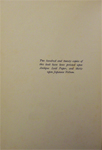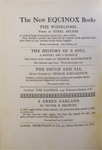100th
MP

|
THE
100th
MONKEY
PRESS |
|
|
|
Limited Editions by Aleister Crowley & Victor B. Neuburg |
|
Bibliographies |
|
Download Texts
»
Aleister
Crowley
WANTED !!NEW!!
|
|
THE TRIUMPH OF PAN |
|
Image Thumbnails |
||||||||||||||||||||||||||||||||||||||||||
|
Title: |
The Triumph of Pan |
Cover State (b)
Rear Cover State (n)
Spine State (b)
Title Page
Limitation Page
Advertisements 1
Advertisements 2 |
||||||||||||||||||||||||||||||||||||||||
|
Variations: |
|
|||||||||||||||||||||||||||||||||||||||||
|
Publisher: |
The Equinox, 124 Victoria Street, S.W.. |
|||||||||||||||||||||||||||||||||||||||||
|
Printer: |
|
|||||||||||||||||||||||||||||||||||||||||
|
Published At: |
London. |
|||||||||||||||||||||||||||||||||||||||||
|
Date: |
10 December 1910. |
|||||||||||||||||||||||||||||||||||||||||
|
Edition: |
First Edition. |
|||||||||||||||||||||||||||||||||||||||||
|
Pages: |
xviii + 181 + 2 Pages of Advertisements. |
|||||||||||||||||||||||||||||||||||||||||
|
Price: |
State (a) priced at 1 Guinea. State (b) priced at 5 shillings. |
|||||||||||||||||||||||||||||||||||||||||
|
Remarks: |
Title page printed in red and black. Quote on page v. printed in red. The last two lines of “The Romance of Olivia Vane” are printed in red. Most of the poems in this book are dedicated to various individuals including Aleister Crowley, Austin Osman Spare, J.F.C. Fuller, Leilah Waddell, Norman Mudd, Ethel Archer and George Raffalovich. |
|||||||||||||||||||||||||||||||||||||||||
|
Pagination: |
|
|||||||||||||||||||||||||||||||||||||||||
|
Contents: |
- Dedication - Dedicatory Lines - Author's Note - The Triumph of Pan - The Flowing fire - The Muse - An Origin - The Cauldron - The Sacrifice - Sleep in the Hills - The Thinker - The Lonely Bride - Selene - A Dialogue - The Lost Shepherd - The Little Prince - Diana Rides - Dollie - The Thief of Time - A Birthday - Osiris - The Sunflower - The Coming of Apollo - Love and Life - Gipsy Tom - The Pilgrim - The Brooding Priest - The Cameo - Under Magdalen Bridge - The Poet's Song - The Creation of Eve - The Artist - Moonset - A Meeting - A Lost Spirit - Music-Pictures I. II. III. IV. Grieg's “Peer Gynt” Suite V. VI. - A New Sea-Song - The Church - Existence - By the River - Sigurd's Songs I. He Summons the Raven II. He Falls to Madness III. He Tells of the Battle IV. He Tells of the Glamour V. He Tells of His Unborn Love VI. Sigurd Seeks the Oracle - Solitude - A Night-Piece - ΘΕΛΗΜΑ. An Epilogue for Norman. - The Romance of Olivia Vane - Epilogue - Index to First Lines |
|||||||||||||||||||||||||||||||||||||||||
|
Author’s Working Versions: |
|
|||||||||||||||||||||||||||||||||||||||||
|
Other Known Editions: |
||||||||||||||||||||||||||||||||||||||||||
|
Reviews: |
THE TRIUMPH OF PAN. By VICTOR B. NEUBURG. The Equinox 5’s
Shame, Mr Neuburg! Also fie! and tut! No dog-nosed and blue-faced baboon in rut Feels as you feel; or if he does, God's mercies Deny him power to tell his thoughts in verses.
This is a most regrettable collection Of songs; they deal with unrestrained affection Unlicensed by the Church and State; what's worse There's no denying they are first-rate verse. It surely cannot be that Pan's in clover And England's days of Sunday-school are over! —PERCY FLAGE (ALEISTER CROWLEY) in The Equinox, March 1911 ______________________________
Victor Neuburg has written some poems. He has something of the poet’s vision, delighting in simplicity and sensuality which is born of passionate admiration. The best poems in this book, “The Triumph of Pan,” are three—“Sleep in the Hills,” “The Little Prince,” “Gipsy Tom” —and of these three, the first is undeniably the most successful.
There is peace on the hills to gather, There a sad, proud soul may sleep; Gold gorse and green purple heather Hold the tears that the salt winds weep, And we will lie down together.
“The Little Prince” is a poem of imagination and charm.
Under the trees I love to lie, Watching the cloudlets over the sky, And the green sward down to the river; The little green leaves prate of the spring, And the wild geese are all on the wing, And the shy little branches quiver.
And in “Gipsy Tom” the metre has something of the terror of slow-dropping hidden water.
Star by star Gleams down there by the hill; They follow, follow on to the bar That lies by the foaming mill. Tom lies dead in the water chill, With a wreath of bubbles about him still.
But there is another side to the poetry of Victor Neuburg. He appears to take strange delight in mysticism, which is never anything but second-hand. Mysticism is perverted sunsuality; it is “passionate admiration” for that which has no reality at all. It leads to the annihilation of any true artistic effort. It is a paraphernalia of clichés. It is a mask through which the true expression of the poet can never be discerned. If he rejects this mask Mr Neuburg may become a poet. —K. M., Rhythm, July 1912 ______________________________
I pass from Mr. Siebenhaar to Mr. Neuberg; which suggests a title for a new volume of literary criticism—“From Neuberg to Siebenhaar: an Epoch of English Verse.” Mr. Neuberg is a follower of Mr. Aleister Crowley, and has all his master’s really notable fluidity and fecundity of expression. In his choice of topics he is somewhat more circumspect than Mr. Crowley. He gives us little of that boring stuff that is usually termed “strong meat,” but in the matter of wind, spray, Pan mouths, hair, throats, Osiris, stars, hermaphrodites, fauns, and obscene gods he is a faithful disciple. His dedicatory poem (printed in red ink) is the one that fascinates me most. It is a tender little lyric, delicate, iridescent, fragrant as a summer dawn. I take the liberty of quoting it in full:—
Omari tessala marax, Tessala dodi phornepax. Amri radara poliax Armana piliu. Amri radara piliu son’; Mari narya barbiton Madara anaphax sarpedon Andara hriliu
I am not quite sure that the apostrophe in “son’ “ can be regarded as legitimite, and I have an uneasy suspicion the “hriliu” has been dragged in owing to the difficulty (which we have all experienced) of finding a rhyme to “piliu.” But, looked at as a whole, this little poem could scarcely have been bettered. —Jack Collings Squire, The New Age, 6 July 1911. ______________________________
Not everyone will care for Mr. Neuburg's tone in all the pieces, but he is undoubtedly a poet to be reckoned with, and a volume so original as this is should create no small stir. It is superbly produced by the publishers. —Sussex Daily News ______________________________
When one comes to the poems . . . it is evident that they are written in English. . . . In a certain oblique and sub-sensible sense, eloquent and musical. . . . Distinctly Wagnerian in their effects. . . . —Scotsman. ______________________________
It is full of “the murmurous monotones of whispering lust,” “the song of young desire,” and that kind of poppycock. —London Opinion
______________________________ A competent master of words and rhythms. . . . His esoteric style is unreasonably obscure from an intelligent plain poetry-lover's standpoint. —Morning Leader ______________________________
A charming volume of poems. . . Pagan glamour . . . passion and vigour. . . . “Sigurd's Songs” are commendable for dealing with the all too largely neglected Scandinavian theology. . . . A scholarly disciple. . . . The entire volume is eminently recommendable. —Jewish Chronicle ______________________________
Three 'Equinox' books (Victoria-street, S.W.) have found their way to us: 'The History of a Soul' and 'The Deuce and All,' by George Raffalovich; and the 'The Triumph of Pan.' poems by Victor B. Neuburg. The first is a story of Paris life, involving a psychological study of character; seriously conceived and finely written, but not at all a happy story, though quite probable for Paris. The second presents a dozen short stories, the first of them passably sane, the remainder about as wild as anything in 'The Equinox,' and that is saying a great deal. They suggest nothing so much as scarlet fever or delirium tremens. 'The Triumph of Pan' is a gorgeous rhapsody, very eloquent but very highly coloured, yards and yards of verses like this:—
Grant me again thy lyre! Let me awaken The old eternal spring; So shall each soul with pangs of birth be shaken, Let the good juices sting. The song I craved is mine, The song of blood and brine: Men shall stand naked, unashamed and free, To flaunt abroad their new-born ecstasy.
We hope not. But, fortunately, there are the police. There is, however, a certain amount of sobriety, pure thought and beauty in many of the short pieces, especially in the 'Music Pictures.' Still, on the whole, we cannot help regretting that such splendid powers of imagination and expression are flung in such literary rioting. —Light, 7 January 1911 ______________________________
Sometimes of much beauty of rhythm and phrase. . . . —Times ______________________________
Poets who have any originality deserve to be judged by their own standard. . . . A Neo-mystic or semi-astrological pantheist. . . . —Liverpool Echo ______________________________
Mr. Victor B. Neuburg is a very lavish versifier, who seems, with a select company of associated (most of them, one imagines, still very young; different poems are dedicated to different members of the clique), to have made a kind of cult of primeval violence. Love-making appears to have an added halo in his eyes if it is associated with delirium or bloodshed. Here is a characteristic stanza from THE TRIUMPH OF PAN, a piece which gives its name to his volume (“The Equinox,” pp. xvii. 181, 5s. net)—
. . . We are sick of dreaming Of a dim past unknown; Oh! for the sight once more of red blood streaming Of rotting warrior-bone, Of eagles hovering far Around the field of war, Of lust and love and longing breaking through The chill gray garb of life to flame anew.
As will be seen, Mr. Neuburg has a “careless rapture” all his own; the carelessness, indeed, is just the trouble. His versification is remarkable, and there is something impressive in its mere fluency. Occasionally, when his subject gives him no loophole for bravado, he becomes a poet; but his work is only readable in small fragments; so luxurious, so rampant, a decadence quickly palls. On the whole, his book must be pronounced a quite grievous exhibition of recklessness and folly. —Manchester Guardian, 4 January 1911. ______________________________
. . . We began to be suspicious of him. . . . Hardly the sort of person we should care to meet on a dark night with a knobby stick in his hand. . . . This clever book. —Academy ______________________________
A vivid imagination fostered by a keen and loving insight of nature, and this allied to a command of richly adorned language, and no inconsiderable power of versification, have already assured for the author a prominent place amongst present-day poets. In his initial poem, and those named “The Lost Shepherd,” and “The Coming of Apollo,” Mr. Neuburg displays an enthusiastic devotion to classic song. Many of the smaller lyrics deserve attention for their sustained metrical charm. From first to last the poet’s work is an important contribution to the century’s literature. —Publishers' Circular, 7 January 1911. ______________________________
This [book] contains the answer to a very well-known riddle propounded by the late Elizabeth Barrett Browning. You remember she asked in one of her poems, “What was he doing to Great God Pan: Down in the reeds by the River?” Well, Mr. Victor Neuburg has discovered the answer, for he was obviously wandering near the river if he was not hidden in the reeds. . . . —ROBERT ROSS in The Bystander ______________________________
There is no question about the poetic quality of much of Mr. Neuburg's verse. . . . We are given visions of love which open new amorous possibilities. —Daily Chronicle ______________________________
Sheer ennui is apt to say “morbid,” and have done with it. . . . But here is Mr. Neuburg, with real literary and temperamental gifts . . . but it is not honest to deny that he is actually straying here and there upon the borders of a definite region of consciousness; that the evil and power he acclaims and fears have a phantom existence. . . . —Westminster Gazette ______________________________
A volume of no ordinary ability . . . real beauty. —Advocate of India ______________________________
Mr. Neuburg is apparently a disciple of Mr. Crowley, and his poems are a mystery beyond the comprehension of the uninitiated. But we can appreciate the beauty of their sound, and envy those lovers in distant countries who will apparently enjoy the meaning. Would not "The Crowning of the Beast" have been an explanatory sub-title? —English Review, April 1911. ______________________________
By a big Pot, no doubt. —John Bull ______________________________
“The Triumph of Pan” contains poems alive with music and rich in thought. Mr. Neubrug writes with distinction, and the book, from first to last, is one which lovers of poetry will appreciate. —Standard ______________________________
The Triumph of Pan' is full of sonorous lines, with wonderful word pictures and poetic imagery which has seldom been excelled. . . . —American Register ______________________________
. . . Many beautiful passages in the volume . . . strange allusions to unpleasant gods, and the imagery is occasionally repellent. The tremendous conception of that “world so wide” . . . at his best in some of the shorter poems . . . stirring rhythm. . . . we linger with delight over the splendid line— 'The murmurous song of the morning star, aflame o'er the birth of day.' . . . Melodious and plaintive with a haunting rhythm . . . vivid and pictorial . . . a painter's vision as well as a poet's ear ... a fine simile in “Osiris” is all his own. —Co-Mason ______________________________
. . . a delirious music . . . the majority of them [the poems] trouble the reader by giving the impression that a deep meaning lies behind the embroidered veil of words to which he is unable to penetrate; others again seem to suggest events of too intimate and personal a nature to have a general application or interest . . . mixed metaphors—erratic visualisation. . . . —Theosophy in Scotland ______________________________
Passion and pain, “red desire” and “red roses” are frequent “motifs” in Mr. V. B. Neuburg's “Triumph of Pan” (“The Equinox” Office), much of which merits the ambiguous distinction of being unusual. Though by no means deficient in originality, vigour or imaginative power, his verse is too often cumbered with the fantastic symbols of a species of erotic mysticism, into which we feel no desire to probe; while the lack of reticence consistently displayed constitutes an artistic blemish not lightly to be excused. The author's serene confidence in the immortality of his lays would be better justified were he to make some attempt to discriminate between the gold and the rubbish, and, incidentally, refraining from penning such grotesqueness as is contained, for example, in “The Sunflower,” where we are informed how, among other portents— “a greater god arose, And stole the earth by standing on his toes And blowing through the air.” It is difficult to believe that the persons to whom certain poems are inscribed will experience any very lively gratification at the compliment. —Athenaeum ______________________________
. . . We are dizzied and dazzled by a foaming rainbow-hued torrent of impassioned words. We are struck by the wealth and boldness of the imagery, and the facility of mechanical execution. . . . It is brilliant work . . . one is bound to admire the cleverness of it all. —Literary Guide ______________________________
. . . In the author of the present collection of poems . . . we have a veritable twentieth-century mystic and apostle of ecstasy who, according to his dedication, gives his songs—
“By the sign that is black and forbidden, By the word that is uttered no more.”
The Triumph of Pan,' from which the book borrows its title, is a remarkable sequence of some forty 'philosophic and ecstatic' stanzas ... He would also seem to 'hold opinion with Pythagoras' although we question if even Nietzsche himself could quite fathom the undercurrent of the lay. ... Despite occasional extravagances in thought and in diction his work is that of a cultured scholar, his verbal artistry undeniably inspired with the true spirit of poetry. Whether he sings of 'Violet skies all rimmed in tune,' of red ravens, of purple kisses, of silver stars “crested with amber melody,” or of the “rhythmic sway of the idle moon,” he is always musical albeit, like Wagner, whose effects he now and then distinctly recalls, often utterly unintelligible. ... In striking contrast to the chaste and serenely beautiful “Diana Rides;” ... are no less that twenty-two audaciously passionate love- lyrics inscribed not only to one Olivia Vane, but also, curiously enough to her “other” lover. —The Gambolier ______________________________
Mr. Neuburg's work is partly mystical and partly of the flesh. . . . Quite frankly, some of his work we do not at all understand. This applies notably to his “Music-Pictures,” which “were obtained under the direct influence of music.” “This,” the poet naively tells us, “may explain their apparent inconsequence.” . . . he is much more than a minor poet. He can and will yet accomplish great work. . . . His ingenious rhyming capacity sometimes almost startles one. In the choice of some of this subjects he is daring—greatly daring. . . . His genius is undoubted; and the world has a lot yet to hear of and from this gifted singer. —Greater London Illustrated |
|||||||||||||||||||||||||||||||||||||||||
